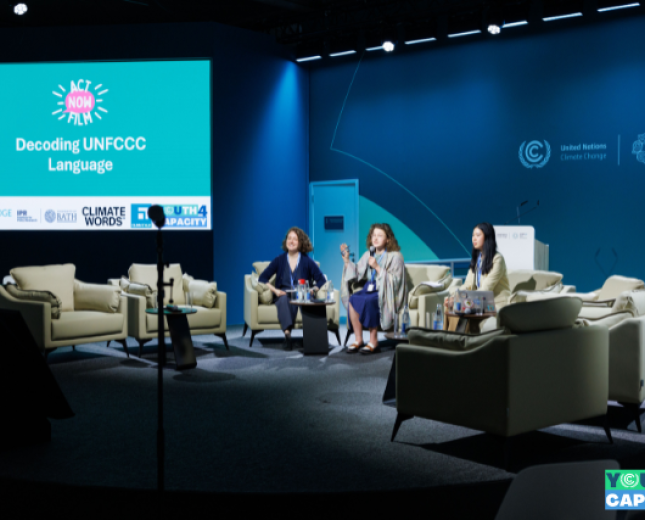Organizers
Youth4Capacity in collaboration with Cambridge Zero, ClimaTalk, Climate Words and The University of Bath Institute for Policy Research (IPR).
Background
Cambridge Zero and the University of Bath IPR have been working together to develop projects which empower and platform young people’s voices in international climate negotiations since collaborating in the production of ActNowFilm at COP26. The most recent iteration of ActNowFilm featured conversations between youth climate leaders and leading international climate experts and was shown at COP28. The production of these films has led to the development of a strand of work which focuses on developing young people’s climate policy skills globally.
The Institute for Policy Research is a leading public policy research at the University of Bath. The primary aim of the institute is to further the public good through research into issues of significant relevance to policy debate and decision-making, manage networks with the worlds of policy and practice, and increase public understanding of policy research through public events and publications. It delivers activities for policymakers, researchers and practitioners to enable dual learning and original contributions to both research and practice.
As understanding the various terminology associated with the UNFCCC process is a key foundational skill for effective youth engagement in climate policy, this session responded to the need for enhancing capacities in this area. Following the successful delivery of this session focused on decoding UNFCCC language by Cambridge Zero and the University of Bath IPR in collaboration with two youth-led organisations with Climate Words and ClimaTalk and, at SB60 in June 2024, this interactive session at COP29 engaged a wider cross-section of youth delegates.
Objectives
This session sought to empower participants to communicate more effectively in the UNFCCC process by:
- Decoding commonly used UNFCCC language
- Enabling them to acknowledge when they don’t understand forms of language and asking for clarification.
General Structure
|
Time/Duration
|
Segment
|
Speaker & Affiliation
|
|
15:00 – 15:03
|
Welcome and Introductions.
|
Millie May, Cambridge Zero & ClimaTalk
|
|
15:03 – 15:08
|
Icebreaker – ClimateWords on Menti.
|
Pamela Elizarrarás Acitores, Climate Words
|
|
15:08 – 15:38
|
Discussion breaking down specific words that relate to likely central themes in the negotiations. Participants to discuss meanings of words in small groups and write down what they think they mean. 10 minutes per word and the smaller groups come back to discuss as a group.
- Loss and damage
- Mitigation & Adaptation
- Just transition
|
Lucy Plummer, University of Bath, Institute for Policy Research
|
|
15:38 – 15:48
|
Presentation based on a Carbon Brief article of what specific words mean in an international and/or diplomacy context
|
Millie May
|
|
15:48 – 16:18
|
Discussion based on breaking down specific phrases that have been the subject of debate in past agreements –
- What does it mean, what does it not mean?
- What countries with what interests advocated for certain changes? What did it mean to them specifically?
|
Millie May
|
|
16:18 – 16:28
|
Participants to share what “intergenerational climate justice” or “loss and damage” is in their own language. How did they translate?
Followed by a discussion on the usefulness of language universality
|
Lucy Plummer
|
|
16:28 – 16:30
|
Closing
|
Millie May
|
Key Outcomes from Group Discussion
- For effective advocacy, understanding the clear distinction between terms often incorrectly used interchangeably such as mitigation and adaptation, is key.
- The need for understanding sections and phrases within an agreement which indicate what is binding and non-binding.
- Interpretation of words and phrases can vary depending on geographic background, culture and other social factors.
- The importance of easily accessible UNFCCC text and capacity building resources in different languages.
Speakers
Credit: UN Climate Change / displayed individuals.
Relevant Resources
Presentation
UNFCCC First Global Stocktake
Paris Agreement
Carbon Brief Article
UNFCCC Style Guide (X Post)
About the organizers
Climate Words
ClimaTalk
Cambridge Zero
University of Bath ActNowFilm
University of Bath Institute for Policy Research




